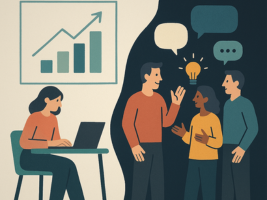THE QUOTE:
“Informal learning is enhanced when humans participate in interactive experiences.” – Allen (2004; Birchfield et al. 2008)
THE JOURNEY:
We believe in the amazing power of informal and social learning, and are excited about the potential these learning approaches offer for ensuring effective workplace learning and performance support. As you would know, we have been trying our best to get more insights and foresights on this subject from industry experts. We have also been constantly sharing our findings and learnings on these with the learning community through our blog posts.
Today, while we are in the midst of designing our first performance support mobile app for our employees (as part of our internal app store), we set out on a quick journey to revisit our most precious resources on informal & social learning in order to see how to integrate these learning approaches into our solution to leverage the power that they offer.
OUR FINDINGS:
Here are a few of the most important thoughts we were able to recall from our interviews (the Crystal Balling Series) and our blog posts on informal & social learning, and we’d like to share these with you:
From Our Crystal Balling Interview Series
- “With the rise and rise of social media, it’s almost inevitable that the ‘20’ will become more important as a channel for learning.” – Charles Jennings (in our interview with him)
- “As more learning designers become aware of the latest research, through their Personal Learning Networks, it will eventually take hold. The industry and our clients move slowly. We just have to keep pushing for positive change and celebrate the small victories.” – Connie Malamed (in our interview with her)
- “The research isn’t heartening. We’re still seeing an avoidance of social learning, the continual use of courses as the only solution, and consequently organizations that can’t adapt fast enough.” – Clark Quinn (in our interview with him)
- “You can see an evident shift from formal curriculum-based learning to informal just-in-time learning, and this is just the beginning!” – Pooja Jaisingh (in our interview with her)
- “To succeed in social media you have to have strong social skills by nature.” – Connie Malamed (in ourinterview with her)
From Our Blog Posts
- “2014 will be the year of Informal Learning, with an increased adoption at the organizational level.” –Top 9 e-Learning Predictions for 2014
- “Distributed practice can be effectively embedded with today’s learning trends such as informal and social learning, gamified learning, and ubiquitous learning.” – Beating the Forgetting Curve with Distributed Practice
- “Though most learning designers possess high levels of skills around the traditional training (formal learning) area, their skill levels fall short around the informal or social learning areas. This is mainly because designing informal and social learning experiences for workplaces demands a diverse and unique set of qualities.” – Top 9 Competencies of an Informal/Social Learning Designer
- “Many of the successful organizations that we see around us today attribute their success to employees who are empowered to learn and innovate at great speeds. These are organizations that have buried their outlook about traditional styles of learning and development (L&D) and embraced new strategies or models. They have realized that, with the traditional approach, it is impossible to achieve a high growth or efficiency because the way people learn has undergone a disruptive transformation…from formal ‘structured’ learning’ to informal ‘social learning’.” – The 70:20:10 L&D Model for Developing a High-Performing Workforce
From Other Sources
- “Before you can help your organization become social, you need to “walk the social talk” yourself.” – Jane Hart (Founder, Centre for Learning & Performance Technologies)
- “In a world of rapid change, we each need to garner as much useful information as possible, sort through it in a way that meets our unique circumstances, calibrate it with what we already know, and re-circulate it with others who share our goals.” ― Marcia Conner (The New Social Learning: A Guide to Transforming Organizations Through Social Media)
- “Participants are happy to engage with one another using social media tools for training purposes. They find it convenient, useful for learning at the moment of need, and develop a greater sense of control over their learning.” – Jane Bozarth (Author, Social Media for Trainers)
- “Virtually everything new seems to come from the 20 percent of their time engineers here are expected to spend on side projects.” – Eric Schmidt (Ex-CEO, Google Inc.)
What other inspiring quotes on informal & social learning have you come across? Please share.
Written by Santhosh Kumar
_________________________________
Published on 13-Jun-2014






